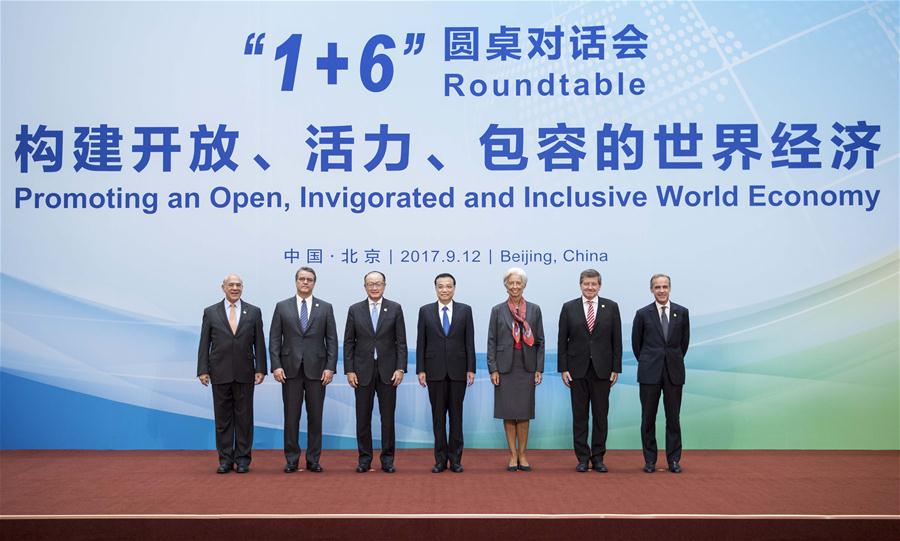


China's Premier Li Keqiang and heads of major international economic institutions pose for pictures before the "1+6" Roundtable Meeting in Beijing, capital of China, Sept. 12, 2017. Li, together with World Bank Group (WBG) President Jim Yong Kim, International Monetary Fund (IMF) Managing Director Christine Lagarde, World Trade Organization (WTO) Director-General Roberto Azevedo, International Labor Organization (ILO) Director-General Guy Ryder, Organization for Economic Cooperation and Development (OECD) Secretary-General Angel Gurria and Financial Stability Board (FSB) Chairman Mark Carney, held the Second "1+6" Roundtable here on Tuesday. (Xinhua/Li Tao)
BEIJING, Sept. 12 (Xinhua) -- All countries should support multilateral trade rules and stay committed to economic globalization for the growth of world economy, Chinese Premier Li Keqiang said on Tuesday.
Li made the comment when hosting the second "1+6" Roundtable with heads of major international economic institutions in Beijing.
The foreign dignitaries are World Bank Group President Jim Yong Kim, International Monetary Fund Managing Director Christine Lagarde, World Trade Organization Director-General Roberto Azevedo, International Labor Organization Director-General Guy Ryder, Organization for Economic Cooperation and Development Secretary-General Angel Gurria and Financial Stability Board Chairman Mark Carney.
"The world economic recovery remains fragile and uneven. This requires countries to act in a spirit of partnership and cooperation to advocate multilateralism," Li said.
In order to spread the benefits of growth more fairly among countries and communities, countries should give priority to employment, create more and better jobs, and make social security benefits more equitable and sustainable to reduce poverty and inequality, Li said.
"China will synergize the Belt and Road Initiative with the 2030 Sustainable Agenda for Development as well as other countries' development strategies to achieve common growth and prosperity," the premier said.
Stressing free trade provides an effective means for tackling the lackluster world economy, Li said the WTO-centered multilateral trading regime must be respected and upheld, as it is vital to the stability of the global economic order.
"Countries need to leverage their comparative advantages to share the fruits of development and address trade imbalances. Rather than closing their doors, countries should pursue greater opening-up and expand mutual openness," Li said.
He suggested greater effort to push forward structural reform and guard against financial risks.
On the Chinese economy, Li said it has shifted from investment- and export-driven growth to one being driven by a combination of consumption, investment and export, and from quantitative expansion to qualitative growth.
The value added of the services sector accounted for 54.1 percent of GDP growth and consumption has become the primary growth driver, contributing 63.4 percent to economic growth in the first half of 2017.
"China remains a leading performer in economic growth and contributes more than 30 percent of global growth," said Li.
Li expressed confidence in medium-high economic growth, saying the Chinese economy grew by 6.9 percent in the first six months and such momentum has been maintained in the second half of the year.
He attributed China's growth to the government's efforts to streamline administration, strengthen regulation, improve services, as well as cut red tape and bring down taxes and fees.
Noting that China's biggest strength in development lies in its rich human resources, Li said China has launched a mass entrepreneurship and innovation initiative across the country, which has greatly unleashed market vitality and social creativity.
Li cited stable employment as a major highlight in the Chinese economy, saying over 13 million new jobs have been created each year for the past four years.
The Chinese government has been implementing the Internet-plus and big data strategies and fostering the digital, sharing and green economies, he said.
Heads of major international economic institutions expressed optimism in the prospects of China's economic growth, saying the country's continuous reform and opening-up will create more opportunities for China and the world economy.
They agreed to strengthen cooperation with China and support the transformation and upgrading of its economy.
They applauded China's firm commitment to maintaining the multilateral trading regime and expected regular discussions with the country on major issues of concern.

 Award-winning photos show poverty reduction achievements in NE China's Jilin province
Award-winning photos show poverty reduction achievements in NE China's Jilin province People dance to greet advent of New Year in Ameiqituo Town, Guizhou
People dance to greet advent of New Year in Ameiqituo Town, Guizhou Fire brigade in Shanghai holds group wedding
Fire brigade in Shanghai holds group wedding Tourists enjoy ice sculptures in Datan Town, north China
Tourists enjoy ice sculptures in Datan Town, north China Sunset scenery of Dayan Pagoda in Xi'an
Sunset scenery of Dayan Pagoda in Xi'an Tourists have fun at scenic spot in Nanlong Town, NW China
Tourists have fun at scenic spot in Nanlong Town, NW China Harbin attracts tourists by making best use of ice in winter
Harbin attracts tourists by making best use of ice in winter In pics: FIS Alpine Ski Women's World Cup Slalom
In pics: FIS Alpine Ski Women's World Cup Slalom Black-necked cranes rest at reservoir in Lhunzhub County, Lhasa
Black-necked cranes rest at reservoir in Lhunzhub County, Lhasa China's FAST telescope will be available to foreign scientists in April
China's FAST telescope will be available to foreign scientists in April